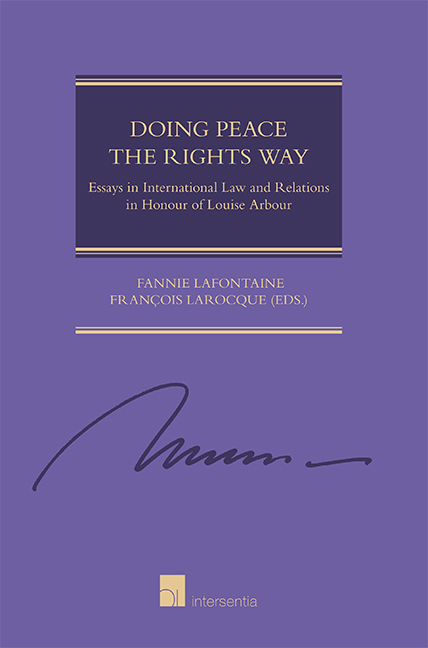Book contents
- Frontmatter
- Foreword
- Contents
- List of Contributors
- Introduction
- PART I OF FREEDOM AND EQUALITY
- PART II OF PEACE AND JUSTICE
- The Deterrence Rationale in a Criminal Justice Accountability Regime
- Peace and Justice: Human Rights Fact-Finding in Raging Conflicts
- “Exceptional Measures” in Times of Crisis: Terrorism, National Security and the Rule of Law
- When the End Lacks the Means: National Prosecutions of International Crimes and Canada's Paper Tiger Approach
- The Independence of International Prosecutors: Where Law Meets Realpolitik
- Torture, Jurisdiction and Immunity: Theories and Practices in Search of One Another
- Revisiting Challenges to International Humanitarian Law
- PART III OF WOMEN AND LEADERSHIP
- An Interview with the Honourable Madam Justice Louise Arbour
The Deterrence Rationale in a Criminal Justice Accountability Regime
from PART II - OF PEACE AND JUSTICE
Published online by Cambridge University Press: 13 April 2019
- Frontmatter
- Foreword
- Contents
- List of Contributors
- Introduction
- PART I OF FREEDOM AND EQUALITY
- PART II OF PEACE AND JUSTICE
- The Deterrence Rationale in a Criminal Justice Accountability Regime
- Peace and Justice: Human Rights Fact-Finding in Raging Conflicts
- “Exceptional Measures” in Times of Crisis: Terrorism, National Security and the Rule of Law
- When the End Lacks the Means: National Prosecutions of International Crimes and Canada's Paper Tiger Approach
- The Independence of International Prosecutors: Where Law Meets Realpolitik
- Torture, Jurisdiction and Immunity: Theories and Practices in Search of One Another
- Revisiting Challenges to International Humanitarian Law
- PART III OF WOMEN AND LEADERSHIP
- An Interview with the Honourable Madam Justice Louise Arbour
Summary
INTRODUCTION
The deterrence rationale finds expression in the criminal justice accountability regime established by the Rome Statute of the International Criminal Court (ICC). The Preamble to the Statute links ending impunity, by the effective prosecution of the most serious crimes of concern to the international community, to the goal of contributing to the prevention of such crimes. Although it is still early in the life of the ICC, some scholars have discerned a deterrent impact from the Court's activities. While it is difficult to measure such an impact with any accuracy, the ICC operates on the assumption that effective prosecution of the perpetrators of war crimes, crimes against humanity and genocide will serve to deter their commission. Prevention may be a goal of uneven achievement, but many people believe that the ICC's involvement in situations does indeed have a preventive effect.
Whatever the long-term impact of the Court's work will be, the immediate purpose of the investigations and prosecutions brought so far under the Rome Statute has been to determine the individual criminal responsibility of persons accused of crimes committed in specific situations and to seek a just sentence for those found guilty. Without effective investigations and prosecutions, there can be no hope of deterrence and ultimately prevention. The Court, however, faces challenges in this endeavour. Certain warrants of arrest issued by the ICC are still unexecuted and fugitives continue to evade justice, while the Court is powerless to bring them to account without decisive cooperation and support from states. Nevertheless, where accused persons have been brought before the Court, a past somewhat uneven record has given way to a more impressive pattern of achievement. The rate of confirmation by Pre-Trial Chambers of charges against accused persons has increased, an indication of the improved quality of work being done by the Office of the Prosecutor (OTP). The trials of these accused are in an advanced stage, but the ultimate results remain to be seen.
The basic premise of the Rome Statute is that states parties have primary responsibility for the investigation and prosecution of genocide, crimes against humanity and war crimes.
- Type
- Chapter
- Information
- Doing Peace the Rights WayEssays in International Law and Relations in Honour of Louise Arbour, pp. 147 - 170Publisher: IntersentiaPrint publication year: 2019
- 1
- Cited by



